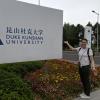Liping Feng
Associate Professor of Obstetrics and Gynecology
Assistant Professor in Pathology
Associate Research Professor of Global Health
Appointment:
Countries:
Liping Feng
Associate Professor of Obstetrics and Gynecology
Assistant Professor in Pathology
Associate Research Professor of Global Health
Liping Feng's lab employs physiological, molecular, and translational approaches to study environmental health, placental biology, fetal programming, and reproductive and maternal health. Dr. Feng has a primary appointment in the Department of Obstetrics and Gynecology of the Duke University School of Medicine and her lab utilizes a wide variety of model systems including primary human trophoblast cells, stem cells, human placental tissue, mice, rats, and rabbits to support this focus. Current projects include 1) studies of the impact of perinatal PFAS exposure on placental function and early programming of fetal development, identifying mechanistic links between altered placental function, fetal growth, and adult health, placental-fetal signaling in modulating fetal immune and brain development; 2) studies of the roles of placental molecular signals in reproduction and neurobehavioral development in offspring using placental specific knockout mouse and cell models and placental imaging.
Projects
-
Perinatal PFAS exposure and immunotoxicity in early life
United States
-
Drinking Water Contamination in NC: Water Use, Human Health and Going Beyond GenX
United States
-
Maternal exposure to e-waste in Guiyu, China and birth outcomes
China
-
Effects of perfluorobutane sulfonate (PFBS) exposure on adverse pregnancy outcomes and fetal development
China, United States
-
The development of a platform mimicking the human placental barrier
United States
Publications
-
Xu D, Lin L, Liu X, Wangzha M, Pang X, Feng L, et al. Characterization of a tomato chlh mis-sense mutant reveals a new function of ChlH in fruit ripening. Plant Biotechnol J. 2025 Mar;23(3):911–26.Menozzi L, Vu T, Canning AJ, Rawtani H, Taboada C, Abi Antoun ME, et al. Three-dimensional diffractive acoustic tomography. Nat Commun. 2025 Jan 29;16(1):1149.Liu Y, Wang Y, Ren T, Yu G, Meng X, Feng L, et al. Unraveling the long-term gastrointestinal impact of perinatal perfluorobutane sulfonate exposure on rat offspring: Intestinal barrier dysfunction and Th17/Treg imbalance. Sci Total Environ. 2024 Dec 10;955:176858.Rawtani H, Jackson J, Gao F, Mellouk N, Myer I, Mora KC, et al. Whole mount preparation and analysis of rabbit mammary gland. Reprod Toxicol. 2024 Dec;130:108740.
See more publications at Scholars@Duke



